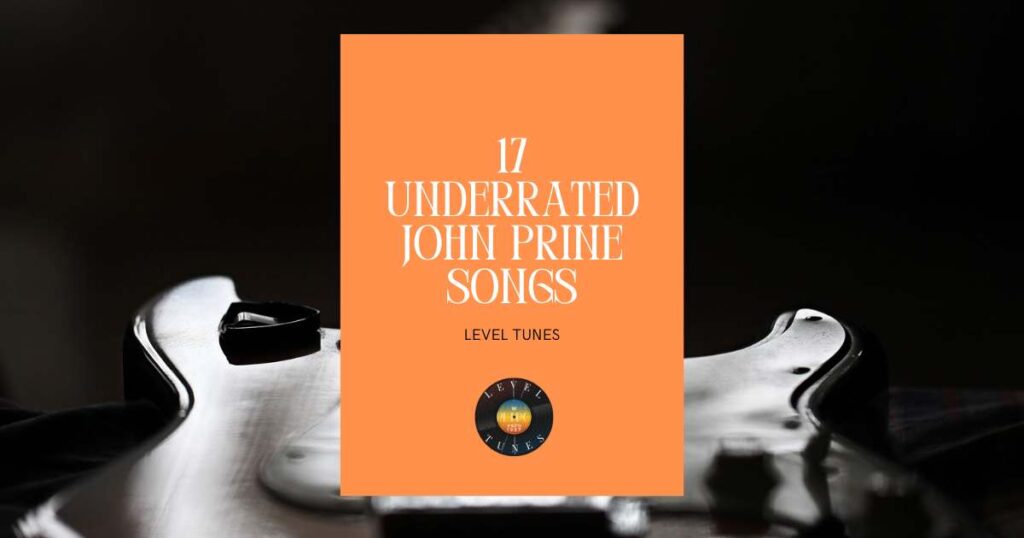17 Underrated John Prine Songs: 17 Must-Hear Tracks
Hey there, music lovers and fellow DJs! It’s TBone here from Level Tunes, and today I’m super excited to share something special with you. As a DJ and a die-hard music enthusiast, I’ve always had a soft spot for the legendary John Prine.
His songs are like hidden gems in a sea of music, each one telling a story that resonates deep within. So, I thought, why not dive into the underrated side of his discography?
I’ve curated a list of 17 John Prine songs that I believe deserve way more attention. These tracks are not just songs; they’re stories, emotions, and experiences that Prine masterfully weaves into melodies.
Whether you’re a long-time fan or new to his music, I promise these tunes will touch your soul. Let’s explore the lesser-known side of John Prine’s musical genius together!
Here are the underrated John Prine songs that you can check out:
List Of Underrated John Prine Songs
Underrated John Prine songs in a list format:
“Spanish Pipedream” (1971, “John Prine”, Atlantic Records)
From his debut album “John Prine,” released in 1971 under Atlantic Records, “Spanish Pipedream” is a classic example of Prine’s storytelling prowess. This song paints a vivid picture of escapism and longing for a simpler life. It’s a blend of humor and poignancy that Prine does so well, urging listeners to “blow up your TV” and live a more authentic life. The song’s catchy melody and Prine’s unique voice make it a standout track. It’s a reminder of his ability to find beauty in the mundane, a quality that has always drawn me to his music.
“Hello In There” (1971, “John Prine”, Atlantic Records)
“Hello In There,” another gem from his self-titled debut album, showcases Prine’s empathy and insight into the human condition. This song is a poignant reflection on aging and loneliness, telling the story of an elderly couple. Prine’s tender vocals and the song’s gentle melody create a deeply moving experience. It’s a reminder to acknowledge and connect with the older generation, a message that’s both timeless and increasingly relevant. This song resonates with me for its emotional depth and Prine’s ability to convey such a powerful message with simplicity.
“Paradise” (1971, “John Prine”, Atlantic Records)
“Paradise” is a song that hits close to home, literally. Featured on his debut album, it’s a nostalgic and melancholic ode to Prine’s childhood memories of Paradise, Kentucky, which was devastated by strip mining. The song’s folk-country blend, combined with Prine’s heartfelt lyrics, creates a sense of longing for a lost home. It’s a powerful commentary on environmental destruction and the loss of innocence. I chose this song for its ability to evoke a sense of place and time so vividly, and for the environmental message that’s as relevant today as it was then.
“Sam Stone” (1971, “John Prine”, Atlantic Records)
“Sam Stone,” from his first album, is one of Prine’s most heart-wrenching songs. It tells the story of a Vietnam War veteran struggling with addiction and the impact on his family. The line “There’s a hole in daddy’s arm where all the money goes” is hauntingly powerful. This song showcases Prine’s skill in addressing complex social issues with empathy and stark realism. I included it for its emotional impact and its relevance in discussing the struggles faced by veterans.
“Angel from Montgomery” (1971, “John Prine”, Atlantic Records)
This track, also from “John Prine,” is a beautifully written song that has been covered by numerous artists. It’s a narrative about a woman dreaming of escape from her mundane life. The song’s blend of country and folk, along with Prine’s raw storytelling, creates a vivid portrait of longing and resignation. It’s a testament to Prine’s ability to write from perspectives different from his own, and I chose it for its universal theme of seeking something more in life.
“Illegal Smile” (1971, “John Prine”, Atlantic Records)
From his debut album, “Illegal Smile” is a song that showcases Prine’s humorous side. It’s often misinterpreted as a drug song, but Prine has clarified it’s more about finding happiness in whatever way you can. The song’s playful melody and Prine’s cheeky lyrics make it a fan favorite. I love it for its lightheartedness and Prine’s ability to make listeners smile, no matter the subject.
“Your Flag Decal Won’t Get You Into Heaven Anymore” (1971, “John Prine”, Atlantic Records)
This song, also from his first album, is a satirical take on blind patriotism. Prine’s sharp wit and the upbeat tempo contrast with the serious message about the misuse of patriotic symbols. It’s a song that makes you think while tapping your feet, a combination that Prine masters. I chose it for its relevance in any era where nationalistic fervor can overshadow critical thinking.
“The Great Compromise” (1972, “Diamonds in the Rough”, Atlantic Records)
From his second album “Diamonds in the Rough,” this song is a metaphorical take on the disillusionment with the American Dream. Prine uses the story of a betrayed lover as an allegory for the nation’s betrayal during the Vietnam War. The song’s folk-rock sound and Prine’s earnest vocals give it a timeless quality. It’s a favorite of mine for its clever songwriting and the way it captures a specific moment in American history.
“The Late John Garfield Blues” (1972, “Diamonds in the Rough”, Atlantic Records)
This track from “Diamonds in the Rough” is a bluesy, melancholic song that reflects on loneliness and despair, inspired by the actor John Garfield. Prine’s ability to weave a narrative that feels both personal and universal is on full display here. The song’s haunting melody and introspective lyrics make it a standout track. I included it for its emotional depth and Prine’s skill in crafting a mood through music.
“Souvenirs” (1972, “Diamonds in the Rough”, Atlantic Records)
Also from “Diamonds in the Rough,” “Souvenirs” is a song about memories and the passage of time. It’s a reflective and bittersweet track, with Prine’s lyrics painting a vivid picture of nostalgia and loss. The acoustic arrangement highlights the song’s introspective nature. I love this song for its poignant reminder of the fleeting nature of life and the lasting impact of memories.
“Grandpa Was a Carpenter” (1973, “Sweet Revenge”, Atlantic Records)
From his third album “Sweet Revenge,” this song is a lively, affectionate tribute to Prine’s grandfather. It’s a personal narrative set to a catchy, upbeat melody, showcasing Prine’s ability to blend humor with warmth. The song paints a vivid picture of a bygone era and the values of hard work and integrity. I chose it for its storytelling and the way it connects listeners to their own family histories.
“Christmas in Prison” (1973, “Sweet Revenge”, Atlantic Records)
This track from “Sweet Revenge” is a beautifully written, melancholic song about spending Christmas in jail. Prine’s imagery and the song’s lilting melody create a poignant contrast between the festive season and the loneliness of imprisonment. It’s a unique take on a Christmas song, and I included it for its originality and emotional resonance.
“Dear Abby” (1973, “Sweet Revenge”, Atlantic Records)
Also from “Sweet Revenge,” “Dear Abby” is a humorous song composed of fictional letters to the famous advice columnist. Prine’s wit and the song’s playful melody make it a fun listen, while also offering commentary on the human condition. I love this song for its humor and Prine’s ability to find lightness in everyday struggles.
“Common Sense” (1975, “Common Sense”, Atlantic Records)
The title track from his fourth album, “Common Sense,” is a gritty, rock-infused song that critiques societal norms and behaviors. Prine’s sharp lyrics and the song’s energetic tempo make it a powerful statement on conformity and the search for individuality. I chose it for its boldness and Prine’s skill
Fun Facts: Underrated John Prine Songs
“Spanish Pipedream”
- Fun Fact: “Spanish Pipedream” is often referred to by its opening line, “Blow up your TV.” This catchy phrase has become a mantra for those seeking a simpler, more authentic life, echoing the song’s theme of escapism and simplicity.
“Hello In There”
- Fun Fact: “Hello In There” has been covered by numerous artists, including Bette Midler and Joan Baez. Its universal message of empathy towards the elderly has resonated with many, making it a timeless classic in Prine’s repertoire.
“Paradise”
- Fun Fact: The town of Paradise, Kentucky, which inspired this song, was actually a real place where Prine’s parents were from. The song has become an anthem in the environmental movement, highlighting the impact of coal mining on small communities.
“Sam Stone”
- Fun Fact: “Sam Stone” is one of Prine’s most poignant songs and is known for its powerful line about the veteran’s addiction: “There’s a hole in daddy’s arm where all the money goes.” This line has been cited as one of the most striking lyrics in folk music.
“Angel from Montgomery”
- Fun Fact: “Angel from Montgomery” is arguably one of John Prine’s most famous songs, despite being more widely recognized through covers by other artists, particularly Bonnie Raitt, whose version brought the song considerable acclaim.
“Illegal Smile”
- Fun Fact: Despite its common misinterpretation as a song about drug use, Prine has clarified that “Illegal Smile” was actually about finding happiness in any situation, showcasing his ability to write with humor and depth.
“Your Flag Decal Won’t Get You Into Heaven Anymore”
- Fun Fact: This song’s satirical take on patriotism became particularly relevant during the Vietnam War era, reflecting Prine’s knack for capturing the socio-political climate of the time through his music.
“The Great Compromise”
- Fun Fact: “The Great Compromise” cleverly uses a personal love story as an allegory for the United States’ involvement in the Vietnam War, showcasing Prine’s ability to weave complex narratives into his songs.
“The Late John Garfield Blues”
- Fun Fact: The song’s inspiration, John Garfield, was a famous actor known for his roles in films like “The Postman Always Rings Twice.” Prine’s song is a tribute to Garfield’s legacy and a commentary on the loneliness of fame.
“Souvenirs”
- Fun Fact: “Souvenirs” is often praised for its poignant lyrics about memories and the passage of time. Prine’s reflective songwriting has made this track a favorite among fans for its emotional depth.
“Grandpa Was a Carpenter”
- Fun Fact: This song is a personal tribute to Prine’s own grandfather. Its lively melody and affectionate lyrics paint a vivid picture of a hardworking, upright man, offering a glimpse into Prine’s family history.
“Christmas in Prison”
- Fun Fact: Despite its somber setting, “Christmas in Prison” has a whimsical, almost romantic quality. It’s an unconventional Christmas song that has found a place in many holiday playlists for its unique perspective.
“Dear Abby”
- Fun Fact: The song’s format, as a series of letters to the advice columnist Abby, showcases Prine’s humorous side and his ability to address everyday problems with a light-hearted touch.
“Common Sense”
- Fun Fact: The title track of his fourth album, “Common Sense” showcases a more rock-oriented sound for Prine. The song’s critique of societal norms reflects Prine’s willingness to experiment with different musical styles and themes.
And there you have it, folks! A journey through the lesser-known but equally brilliant side of John Prine’s music. Each song is a testament to his genius, a blend of humor, empathy, and storytelling.
Dive into these tracks and discover the magic of Prine’s world. Until next time, keep the tunes spinning!
Thanks for reading.
TBone




